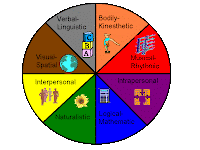Teachers, I'm sure we all have students who differ in all of these intelligences. That is why, we need to create lessons to meet all of these children's needs. Howard Gardner's multiple intelligences discusses all eight of the different types that your students would fall under. Through drama, all of these intelligences could be meet, and all students no matter what category they fall under could be included. Drama is very flexible and versatile and can improve a students learning because of it's diversity.
1) Visual/spatial Intelligence- think in terms of physical space. They are very aware of their environments. They like to draw, do jigsaw puzzles, read maps, daydream. They can be taught through drawings, verbal and physical imagery. Tools include models, graphics, charts, photographs, drawings, 3-D modelling,television, multimedia, texts with pictures/charts/graphs.
2)Bodily-kinesthetic - use the body effectively, like a dancer or a surgeon. Keen sense of body awareness. They like movement and they communicate well through body language and be taught through physical activity, hands-on learning, acting out, role playing.
3)Musical - show sensitivity to rhythm and sound. They love music and sound. They can be taught by turning lessons into lyrics, speaking rhythmically, tapping out time. Tools include musical instruments, music, radio, stereo, CD-ROM, multimedia.
4)Interpersonal - understanding, interacting with others. These students learn through interaction. They have many friends, empathy for others, street smarts. They can be taught through group activities, seminars, dialogues. To5)ols include the telephone, audio conferencing, time and attention from the instructor.
5)Intrapersonal - understanding one's own interests, goals. These learners tend to shy away from others. They're in tune with their inner feelings; they have wisdom, intuition and motivation, as well as a strong will, confidence and opinions. Tools include books, creative materials, diaries, privacy and time. They are the most independent of the learners.
6)Linguistic - using words effectively. These learners have highly developed auditory skills and often think in words. They like reading, playing word games, making up poetry or stories. They can be taught by encouraging them to say and see words, read books together. Tools include computers, games, multimedia, books, tape recorders, and lecture.
7)Logical/Mathematical- Think conceptually, abstractly and are able to see and explore patterns and relationships. They like to experiment, solve puzzles, ask cosmic questions. They can be taught through logic games, investigations, mysteries.
http://www.tecweb.org/styles/gardner.htmlhttp://www.tecweb.org/styles/gardner.html

No comments:
Post a Comment